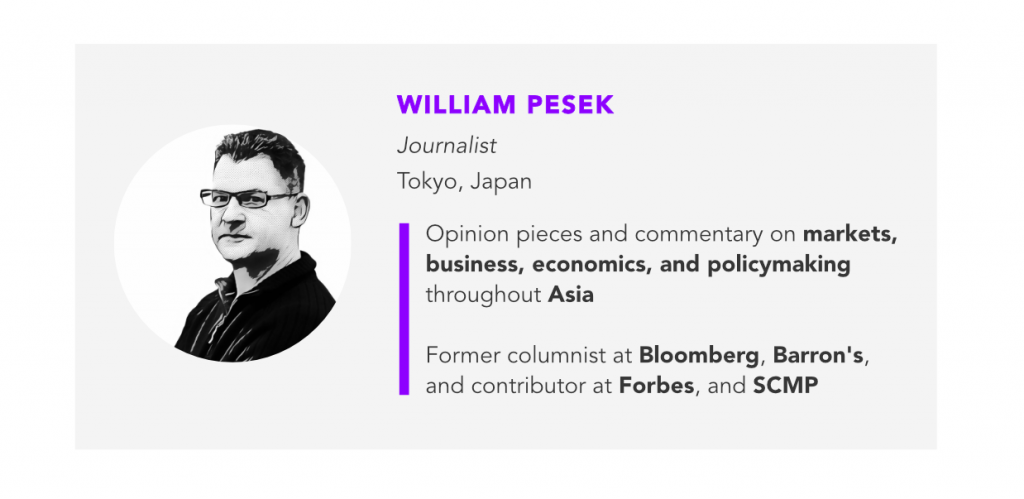Much has been made of the clear divergence between Asia’s embrace of blockchain innovation versus the West. But three seemingly disparate storylines this month suggest the gap might be widening as we speak.

The first is South Korea creating a special enterprise zone for cryptocurrency trading and initial coin offerings. China’s fast-accelerating timetable for issuing its own digital currency is the second. The third: how turmoil in global markets, lots of it emanating from Asia, has money returning to blockchain assets in quiet but impactful ways.
The Korean part of this discussion centers on Busan, the southeastern port city that’s home to the nation’s biggest population after Seoul. President Moon Jae-in’s government declared Busan a blockchain “regulation-free” zone.
The enterprise is emblematic Korea’s love-hate relationship with the cryptocurrency game. The last 20 months saw more zigs and zags from Seoul regulators than observers can count — banning Bitcoin trading and ICOs one day, greenlighting them the next.
Busan, though, could be a model for Asian economies –- so long as Seoul takes a couple of big risks of its own. One is okaying ICOs. Korea must act soon to legalize the ability to raise from retail investors. It’s been reluctant to date. A thriving ICO pipeline, though, is pivotal to funding blockchain development projects that accelerate the market’s development.
That will happen. The real driving philosophy was set in motion in December 2017. That was when Korea’s Ministry of Finance, while detailing concerns about an undeveloped crypto infrastructure, highlighted its intention to get a piece of the “big revenue sources” sure to emanate from the market.
Asia, as Korea’s MOF explained, has long been chronically short of the kind of free-flowing risk capital enjoyed in the West. That cash is vital to catalyzing any number of startup revolutions needed to create new jobs and wealth and disrupt economies from Japan to Indonesia.
It makes perfect sense, then, that Asia is leading efforts to find a middle-ground in which blockchain-derived assets can thrive. The dilemma: pulling crypto-assets into the conventional financial system while also preserving the unique features and utilities that have central banks literally fearing irrelevance.
Case in point: machinations at the People’s Bank of China. In recent days, PBOC wags have been buzzing about Beijing accelerating the timetable for introducing a state-backed crypto or digital currency. While reporting is all over the place, the common threat is Facebook. Just as Mark Zuckerberg’s “Libra” gambit spooked Washington, the specter of a private unit of exchange is proving quite the wakeup call in Beijing.
Both Reuters and Bloomberg are reporting some kind of PBOC coin is “close to being out.” It’s not hard to connect the dots of this sudden urgency to Facebook’s desire to front-run the currency-innovation market.
Though China has long been home to some of the most ambitious Bitcoin mining operations, it is resistant to decentralized crypto assets. Yet super-centralized one issued by the central bank would serve many purposes for Beijing. Control of risks from money laundering to tax evasion, for one thing. A means of giving the central bank greater influence over the amount of cash in circulation, for another.
Geopolitical considerations abound, too. In recent years, President Xi Jinping has worked to increase the yuan’s role in global trade and finance. One major success was prodding the International Monetary Fund to add the yuan into its top-five reserve-currency basket. Yet the PBOC may get greater traction — and faster — by getting on the blockchain bandwagon.
The why of China’s role in the storyline is clearer than the how. In the telling of Mu Changchun, deputy PBOC director, China envisions a “two-tier” system — one for central banks to issue digital currency, another for financial institutions. Either way, Beijing’s haste is Exhibit A of how Libra is already shaking up the global landscape. Other central banks, from Seoul to Tokyo to Washington, would feel compelled to match Beijing.
Yet the third Asia storyline — market turmoil — is the most urgent of all. Last month, Wired carried a piece headlined “The Serious Money Is Warming To Bitcoin.” In it, the magazine details an “arms race” over methods to store cryptocurrencies safely around the globe. It looks at how household names from Fidelity to JP Morgan are growing crypto-related businesses.
Bitcoin’s rally in recent months, though, can’t be divorced from the mainstream markets that boosters hope it will one day eclipse. Its nearly 190% rally this year is in large part a reflection of turmoil related to the U.S.-China trade war. That is helping crypto assets earn a bit of the “digital gold” safe haven status that fans had long envisioned.
The correlation between the price action in Bitcoin and gold is impossible to explain away. Nor does it seem a coincidence that major cryptocurrencies appear to be negatively correlated with the yuan.
Last month’s drop in China’s currency, remember, gave global markets one of its biggest frights in years. It’s complicated, of course. The yuan’s 6% drop since April is partly a reflection of slowing Chinese growth. As China loses altitude, capital is leaving Asia’s biggest economy. Yet Xi’s team allowing the currency to weaken past the psychologically-important 7 to the dollar level is also a swipe at Trump’s tariffs.
The fallout in markets lent support to cryptocurrencies. Sure, some of the demand reflects mainland millionaires – and billionaires – employing crypto assets to spirit money out of the mainland. But a clear something’s-amiss-with-capitalism dynamic is driving money out of the dollar and the yuan.
That this dynamic is emanating from Asia, the world’s fastest-growing region, adds to the intrigue. The market panic of the inversion of the U.S. yield curve has hit Asia particularly hard. Its export-addicted economies are directly in harm’s way as Trump’s America flirts with recession.
It’s not just the U.S., of course. Between uncertainty about Brexit, a traumatized Europe slowing down, Argentina back in crisis and Hong Kong on the brink, Murphy’s Law seems to be in the driver’s seat. It hardly helps that the world’s two biggest economies are intent on tackling each other.
Each of the last seven downturns were preceded by 10-year Treasury yields falling below those of shorter-term securities. And considering how economies from Germany to Singapore seem about to fall into the red, the odds of a U.S. recession are rising fast. And increased Trumpian turmoil as the president bullies his own central bank to cut rates and weaken the dollar.
Taken together, these seemingly disparate themes point to an Asia region, for better or worse, forging ahead with blockchain experimentation. And, of market chaos creating as many opportunities for the crypto space as reasons for worry.
Here, Japan deserves a big shout-out, too, as it leads the push for common-sense regulations that protect investors, while still fostering innovation. It’s a challenging balancing act. But there can be little doubt that Asia is on it.




